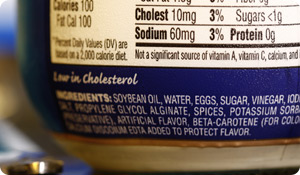
Preservatives keep food products fresh long enough for them to get from the factory to the supermarket and eventually find a place on your dining table. They do this by slowing down the natural breakdown of fats, delaying the ripening process of fresh foods, and destroying or slowing down the growth of bacteria and other microorganisms that would otherwise grow on food.
Sometimes, preservatives are used strictly to keep foods safe, but they are also used to maintain the quality of a food. For instance, bacon and other processed meat products that contain preservatives stay fresh and safe to eat for longer periods of time than similar products that are preservative-free. Canned foods, however, stay safe to eat for years because of the temperatures and technology involved in the canning process. Any preservatives used in canned foods are most likely there to preserve the color, texture, or overall integrity of the product but have little or nothing to do with safety.
Salt and sugar are natural preservatives that help prevent spoilage if used in high enough amounts in certain foods, such as salt in dried meats and sugar in fruit jams. While you may want to limit the amounts of salt and sugar you consume in your overall diet, government leaders and consumer advocacy groups have few grounds for limiting their use by manufacturers in individual food products. When it comes to the level of chemical preservatives in some products, however, the food police step in.
Chemical food preservatives are included on the ingredient list required on all packaged foods. Some common preservatives you will see listed that are limited by government regulation include benzoates, sorbates, propionates, sulfites, sulfur dioxide, nitrites, nitrates, propyl gallate, BHA, BHT, erythorbic acid, and citric acid.
The Center for Science in the Public Interest (CSPI), a consumer watchdog organization, categorizes these preservatives as follows:
- Safe: citric acid, erythorbic acid, sorbic acid
- Cut back: salt, sugar
- Use with caution: BHT
- Certain people should avoid: sodium benzoate, sulfites, sulfur dioxide
- Avoid: BHA, propyl gallate, sodium nitrate, and sodium nitrite
In reviews of animal and human studies, CSPI found some associations between BHA, propyl gallate, sodium nitrate, and sodium nitrite and an increased risk of developing cancerous tumors. But because there is not enough evidence showing a direct cause and effect between these preservatives and the onset of disease, they remain in use.
Sources:
Center for Science in the Public Interest: Chemical Cuisine
http://www.cspinet.org/reports/chemcuisine.htm
Oberg, C. "Food Preservation," Weber State University. Web. 11 Nov 2011
http://faculty.weber.edu/coberg/3853%20Food%20Preservation.htm





